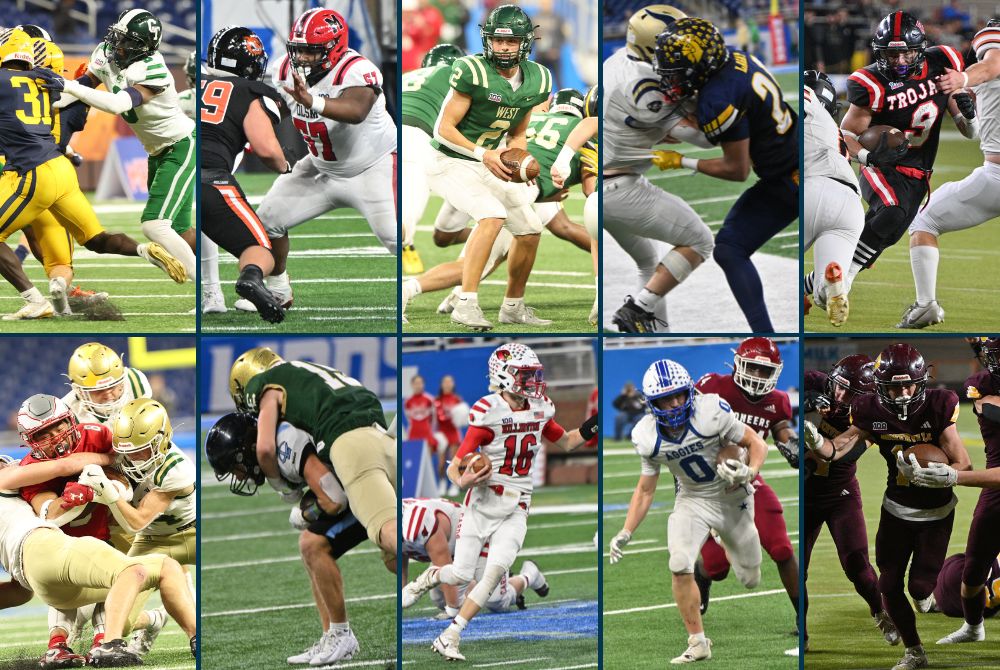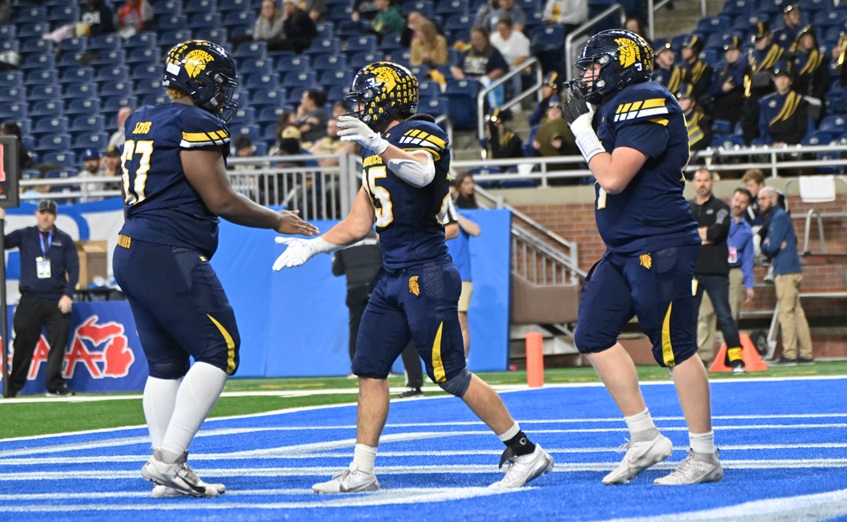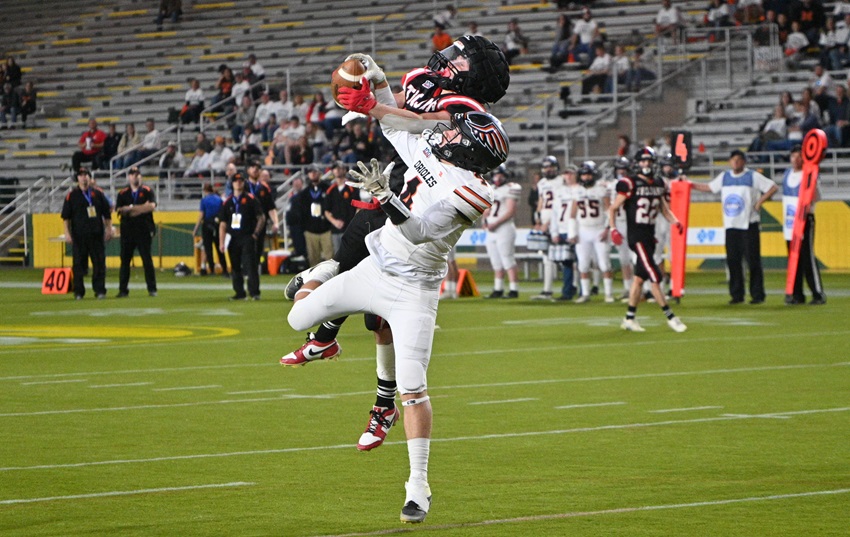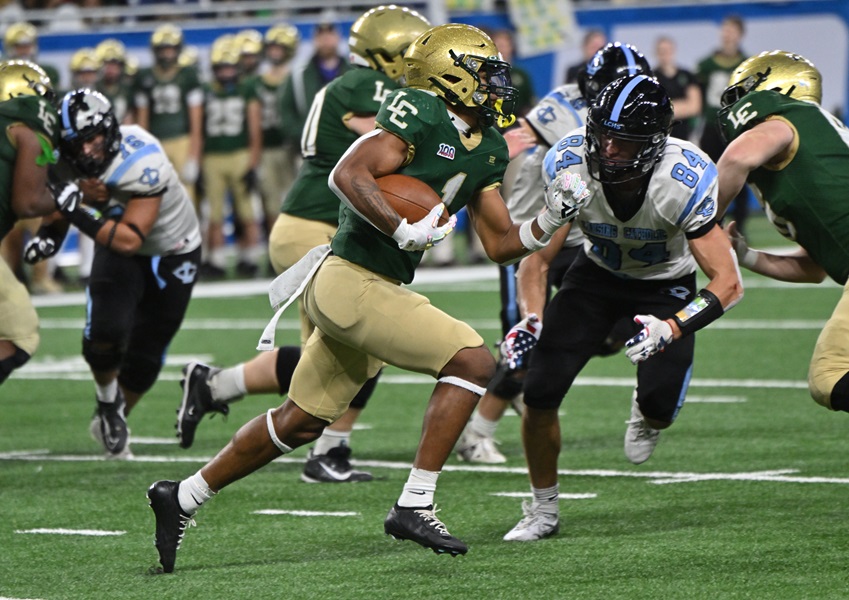
Coach Comes Home to Lead Central's Rise
By
Tom Markowski
Special for Second Half
September 27, 2017
DETROIT – Thirty-three years ago, Lynn Sanders graduated from Detroit Central. And before he left, he made a promise.
 Last year, Sanders showed he is a man of his word.
Last year, Sanders showed he is a man of his word.
Sanders, 51, is in his second season as the head football coach at Central. Once a proud program under legendary coach Woody Thomas (who died in 2002), the program had wavered a bit. Coaches like Michael Thornhill, who took over for Thomas in 2002, Eric Smith, Robert Hunt and others have had some success. But stability within the program, especially in recent years, had been missing.
Many of the high school-age students in the neighborhood were attending schools elsewhere in the city. Now-closed Detroit Allen Academy, a charter school near Central, was one alternative. Open enrollment throughout the school district also allowed students to attend any school in Detroit, and many were taking advantage of the opportunity.
Since Sanders’ arrival, and because of his standing in the community, many of those in the neighborhood have decided to remain. Sanders and his staff have been able to make the Trailblazers relevant again, and there’s a renewed respect for the program. Central is 4-1 and 2-1 in the Detroit Public School League Black division and faces Detroit Pershing (1-4, 0-3) this week before taking on Detroit Martin Luther King (4-1, 3-0), one of the state’s elite programs, on Oct. 6.
“When I was 18, I told Coach Thomas I would replace him,” Sanders said. “It took a while.”
The rewards have come quickly.
Last fall in Sanders’ debut, and for the second time in school history, the Trailblazers won two playoff games in a season and finished 7-5. And they led Millington 20-0 in a Division 6 Regional Final before falling 22-20.
 There had been success in the recent past. Central tied a school record for victories in a season with a 9-3 finish in 2010. In 2012, the Trailblazers began a run of making the playoffs in three of the next five years, each time finishing 6-4 – although the playoff appearances in 2014 and 2015 ended quickly as Central lost first-round games by a combined score of 107-14.
There had been success in the recent past. Central tied a school record for victories in a season with a 9-3 finish in 2010. In 2012, the Trailblazers began a run of making the playoffs in three of the next five years, each time finishing 6-4 – although the playoff appearances in 2014 and 2015 ended quickly as Central lost first-round games by a combined score of 107-14.
The Trailblazers took a sizable next step led by someone taking his first at the high school level. Sanders had never been a head coach, but he brought a long list of credentials while working with youth football. A 27-year veteran with the Michigan State Police, Sanders spent 10 years as the president of the Southfield Ravens, a Pop Warner program for players aged 8-11. He spent three years as a league commissioner within Pop Warner in southeastern Michigan. For two years he was a regional commissioner for American Youth Football (AYF).
Before getting the Central job, Sanders worked under coach Keith Stephens at Oak Park and then with Stephens at Southfield-Lathrup as his offensive coordinator.
Then there was a knock on the door of opportunity.
“I got a call from David Oclander, who was the (Central) principal then,” Sanders said. “We met and he told me what he was looking for. He knew of me, knew I was a Central grad, and he told me he wanted to turn things around.
“When I got here the team GPA was 1.9. The first day I called a meeting. I had all of the guys who wanted to play be there. When I gave that speech, I could tell they weren’t really happy. I was their third coach in three years, and I think they felt betrayed. They weren’t really interested. A number of them were looking at their phones, not paying attention. I told them here are my rules, my expectations and if you don’t like it you can leave. About half of them did. Fifteen stayed.”
It didn’t take long for Sanders to build upon those numbers. His association with Pop Warner and coaches in the area helped spread the word that expectations would rise.
In the meantime, Allen Academy closed following the 2015-16 school year and many of those students went to Central – including some athletes who had played on a Wildcats team that finished 5-4 in 2015.
 Central didn’t have a freshmen or junior varsity team, but Sanders was able to gather 36 for the varsity. He has 32 this season.
Central didn’t have a freshmen or junior varsity team, but Sanders was able to gather 36 for the varsity. He has 32 this season.
“When I took the job I got phone calls from all over the place,” he said. “Coaches, former players, they all wanted to help. They’d do anything for me. I was well-respected, and the kids started to come. Instead of taking buses out of the neighborhood and going elsewhere, they stayed home. And they were good kids. I set some high expectations. Those that didn’t want to follow got shipped out.”
Sanders and Oclander saw eye-to-eye on many issues. The main objective was to instill discipline, and both came from a background where discipline was paramount: Sanders with the state police, Oclander as a retired lieutenant colonel in the U.S. Army.
Sanders looked to improve the quality of coaching his players were to receive in two ways. The first came during the offseason. He knew his players didn’t have the finances to go to camps, even if they were close by at places like Wayne State University. Instead, Sanders brought the college coaches to Central. Staffs from Northwood University, Eastern Michigan and Wayne State all came to Central to conduct a camp.
“That had never been done before at Central,” Sanders said.
The second was to convince coaches in the area that Central was the place to be. Eighteen said yes. Do the math: That’s more than one coach for every two players. It’s safe to say that’s a unique situation – and has led to an almost unheard of type of mentoring process.
And the players are reaping the results. Eight players from last year’s team are playing college football. Five players from this year’s team have made verbal commitments to a college or university, including El Julian Jordan. Jordan, a 6-foot-2, 220-pound quarterback who played his first two years of high school football at King, has accepted a scholarship to Western Michigan.
It was a big change for Jordan to go from a program like King, with 1,400 students, to Central where the enrollment is 370.
“It was a tough transition,” he said. “The kids in school were different. This school is so small, but I like it that way. I can focus more on my grades and such.
“I look up to (Sanders). He’s molded me into a leader. I lead by example. My first impression of Coach was a positive one, and that’s good.”
Jordan has had a fine season to this point, completing 56 of 95 attempts for 1,239 yards, 13 touchdowns and with no interceptions. He’s scored three rushing touchdowns.
 “He’s a special kid,” Sanders said. “I don’t think anyone has put him in the position of being a leader before. After time, he knew he could trust me. He’s a phenomenal athlete. He’s a quiet kid until you get to know him. As we made our run in the (playoffs), the different (officiating) crews would watch him warm up. He can throw the ball 70 yards. And they couldn’t wait to see him in action.”
“He’s a special kid,” Sanders said. “I don’t think anyone has put him in the position of being a leader before. After time, he knew he could trust me. He’s a phenomenal athlete. He’s a quiet kid until you get to know him. As we made our run in the (playoffs), the different (officiating) crews would watch him warm up. He can throw the ball 70 yards. And they couldn’t wait to see him in action.”
Other top players include a bevy of receivers including Jerodd Vines, TaQuan Snead and Brandon Cooper.
Central returned all five offensive linemen from a season ago including Jamauri’a Carter (5-10, 305). Carter, Snead and Jordan all played on the Eastside Raiders in the Police Athletic League (PAL) before high school.
Sanders’ stay at Central could be a brief one. He and wife, Kathy, who were high school sweethearts, have four children including three sons. One, Londale Sanders, is a junior linebacker at University of Arkansas-Pine Bluff. They recently returned on Sunday after watching their son play in last Saturday’s 34-27 overtime victory at Jackson State.
Another son, Lance Sanders, is one of the offensive line coaches at Central.
“I don’t know how long I’ll do it,” Lynn Sanders said. “I wanted to turn things around. I don’t know how long I’ll be here. I told my wife three years, tops, and see what happens. At least Central is back where parents, the people in the neighborhood are coming back. The kids are getting better. The test will be against King.”
 Tom Markowski is a columnist and directs website coverage for the State Champs! Sports Network. He previously covered primarily high school sports for the The Detroit News from 1984-2014, focusing on the Detroit area and contributing to statewide coverage of football and basketball. Contact him at [email protected] with story ideas for Oakland, Macomb and Wayne counties.
Tom Markowski is a columnist and directs website coverage for the State Champs! Sports Network. He previously covered primarily high school sports for the The Detroit News from 1984-2014, focusing on the Detroit area and contributing to statewide coverage of football and basketball. Contact him at [email protected] with story ideas for Oakland, Macomb and Wayne counties.
PHOTOS: (Top) Detroit Central quarterback El Julian Jordan warms up before a game. (Middle top) Lynn Sanders, left, and offensive coordinator Kevin Rogers. (Middle below) Jordan surveys the field looking for a receiver. (Below) Sanders and wife Kathy. (Photos courtesy of Lynn Sanders and Detroit Central football.)

1st & Goal: 2024 Finals in Review
By
Geoff Kimmerly
MHSAA.com senior editor
December 4, 2024
The story of the 50th MHSAA Football Playoffs may have been driven as much by the run-up to the Finals of these last two weekends as by those 10 championship games themselves.
 But those games at Ford Field and the Superior Dome left us with their shares of unforgettable moments as we celebrated another special moment of this overall 100th MHSAA anniversary.
But those games at Ford Field and the Superior Dome left us with their shares of unforgettable moments as we celebrated another special moment of this overall 100th MHSAA anniversary.
Goodrich, Pontiac Notre Dame Prep and Millington celebrated championships for the first time. Jackson Lumen Christi moved into first all-time with its 14th Finals title. The average margin of victory may not have been close this time around – winners did so by nearly 24 points, and we had just one single-digit game out of 10 – but consider as well the excitement generated on the way to these concluding weekends. Of the 20 teams ranked Nos. 1 or 2 by the Michigan High School Football Coaches Association at the end of the regular season, only five reached championship games – and only three won them.
We had senior standouts rewrite the scoring side of our 11-player Finals record book, star quarterbacks face off in an 8-player classic, and an uncountable number of unforgettable moments as nearly 45,000 fans traveled to witness the beginnings of our latest trophy celebrations.
MHSAA.com once again covered all 10 championship games, with quick recaps and links to those stories below followed by notations of performances entered into the MHSAA Finals record books and a report on some of the main storylines to emerge as those championships were being decided.

Finals in Review
11-Player Division 1: Detroit Cass Tech 42, Hudsonville 20 – Read
The Technicians won their fourth championship and first since 2016 by shutting down Hudsonville’s powerful rushing attack and dominating the air with freshman quarterback Donald Tabron II completing 15 of 20 passes for 176 yards and three touchdowns to arguably the top receiving group in the state. Cass Tech built a 35-0 lead by a minute into the second half.
11-Player Division 2: Orchard Lake St. Mary’s 35, Byron Center 19 – Read
Orchard Lake St. Mary’s also won its first championship since 2016 with a mostly second-half burst after trailing 13-7 until the final minutes of the second quarter. Darrin Jones and Bryson Williams both ran for more than 100 yards and a pair of touchdowns as the Eaglets also shut down a Byron Center offense that averaged nearly 40 points per game entering championship weekend.
11-Player Division 3: Zeeland West 42, Detroit Martin Luther King 22 – Read
Paced by a record-setting performance by running back Keaton Hendricks, Zeeland West and its T-formation attack defeated a fourth top-seven ranked team during this playoffs. The Dux presented a look King hadn’t seen in years and turned it into not only a 352-295 total yardage advantage but also a 30:10-17:50 edge in time of possession as it piled up points against a King defense that had given up just 13.6 per game on the way to the Final.
11-Player Division 4: Goodrich 35, Niles 6 – Read
Goodrich won this matchup of finalists seeking their first championship, dominating the line of scrimmage to the tune of a 424-96 advantage in total yardage. Chase Burnett did the most damage of a talented Martians group of playmakers, running for 157 yards and a pair of scores while their defense locked down a Niles attack that averaged 41 points per game entering this matchup.
11-Player Division 5: Pontiac Notre Dame Prep 42, Frankenmuth 7 – Read
This also featured a pair of first-title hopefuls, and Notre Dame Prep took one home coached by Pat Fox, who grew up in and has since moved back to Frankenmuth. Quarterback Sam Stowe starred for the Fighting Irish, throwing four touchdown passes as NDP took a 35-0 lead into the fourth quarter and frustrated a Frankenmuth attack that had outscored its opponents by 31 points per game.
11-Player Division 6: Jackson Lumen Christi 56, Lansing Catholic 18 – Read
Lumen Christi’s record-setting win came on a record-setting performance by running back Kadale Williams, who ended up with a combined 590 yards and eight rushing touchdowns over his last two Finals appearances after also carrying the ball once in the Titans’ 2022 championship game. Lumen’s title was its third-straight with the first two of this string coming in Division 7
11-Player Division 7: Millington 24, Monroe St. Mary Catholic Central 0 – Read
Millington finished its first championship run as also the only undefeated 11-player champion this season. The Cardinals were physically dominant as they posted their fifth shutout and lowered their points allowed per game average to 7.7. In this win, they allowed just 3.2 yards per carry and forced three turnovers, limiting an SMCC offense averaging 36 points per game entering the weekend.
11-Player Division 8: Beal City 43, Riverview Gabriel Richard 14 – Read
Physical play and a strong running game were the story of this championship decider as well as Beal City won its third title and first since 2009 behind 315 rushing yards. The Aggies strung together unanswered runs of 21 and 17 points and held Gabriel Richard scoreless for the final 22 minutes of the first half and final 12 of the second.
8-Player Division 1: Deckerville 30, Pickford 28 – Read
Pickford led until the opening seconds of the fourth quarter as Deckerville came back from a double-digit third-quarter deficit to win its first championship since 2012. Both teams entered the matchup undefeated, and both relied on star quarterbacks who wrote their names into the Finals record book.
8-Player Division 2: Crystal Falls Forest Park 42, Morrice 20 – Read
The Trojans played in their 15th championship game and won for the fifth time after taking a 28-0 lead into the break and running for 184 of their total 291 yards during the first two quarters. Coach Brian Fabbri, who had played for Forest Park in 11-Player Finals in 2004 and 2005, became the fourth title-winning coach in program history.

Records Report
Zeeland West senior Keaton Hendricks scored a Finals record six touchdowns – to also give him a Finals-record 36 points. He rushed for three and caught three scores, and the three receiving touchdowns tied for second-most on that list.
Before Hendricks’ accomplishments a day later, Jackson Lumen Christi senior Kadale Williams briefly sat atop four record book lists. He remains the record holder with 314 rushing yards and five rushing touchdowns and sits tied for second with five total touchdowns and 30 points scored in a championship game. His 314 rushing yards also put him on the total yardage list.
Junior quarterback Sam Stowe directed Notre Dame’s offense during the championship drive, reaching the record book with 293 yards passing and four touchdowns through the air including one score on one of the longest completions in Finals history – 87 yards to Billy Collins. Stowe also ran for eight yards, making the total yardage list with 301.
Lansing Catholic senior quarterback Alex Fernandez earned multiple record listings with 284 passing yards, 21 passing completions and 366 total yards; he also ran for 82. Senior receiver Xavier Luea tied for the fifth-most receptions in a championship game, pulling in 10 for the Cougars.
Four kickers reached the record book list for most extra points in one game. Jackson Lumen Christi senior Andy Salazar tied two others for the record with eight extra points, making all eight kicks he took in the Division 6 Final. Notre Dame Prep junior Owen Fulsher made six extra points in six attempts, and Orchard Lake St. Mary’s freshman Beckett Kiefer, Beal City senior Kyle Martin and Goodrich senior Landon Williams all made the list with five extra points in five tries.
As noted above, Jackson Lumen Christi set a record for championships with 14, breaking its tie with Farmington Hills Harrison (which closed at the end of the 2018-19 school year). Lumen scored 42 points during the first half of its Division 6 win, tying for third-most in one half, and its 56 total points tied for second-most for a full title game. The Titans also tied a record with seven rushing touchdowns total and made the list – with Niles in Division 4 as well – for fewest pass attempts, with three.
Lansing Catholic made the team list for most pass completions with 21, and Notre Dame Prep made the team list for passing yards with 293.
As seems to make sense with some of our winning teams’ offensive successes, four made the list of those to not punt during a Final – Zeeland West, Beal City, Goodrich and Jackson Lumen Christi. West also combined with Detroit Martin Luther King, and Beal City with Riverview Gabriel Richard, to make the list for fewest punts by both opposing teams combined. Both pairs had just one in their games.
Although in defeat, Pickford senior quarterback Tommy Storey was one of the stars of the 8-Player Finals, making lists with four total touchdowns, 304 rushing yards (ranking second), four rushing touchdowns and 312 total yards. His opposing quarterback, Deckerville senior Hunter Garza, also made multiple lists with 323 total yards and 225 rushing.
Crystal Falls Forest Park sophomore Dietrich Rasner made the extra points list, tying for second with six in six attempts, and Morrice senior Joel Fisher had the second-longest punt return in 8-Player Finals history bringing one back 85 yards for a score.
Pickford and Deckerville both reached 300 yards rushing in the Division 1 game, Pickford with 322 and Deckerville just missing the record book yardage list but setting a record with 60 rushing attempts. Deckerville also made the first downs list with 21.
Crystal Falls Forest Park made a rushing list, with six touchdowns running the ball. The Trojans also set a record by not allowing Morrice to gain a yard passing – with the Orioles becoming the first 8-player team to not complete a pass in a Final, attempting just four.

Stories Behind the Scores
Lumen Legend: Of Jackson Lumen Christi’s now-14 Finals championships, 12 came under the leadership of coach Herb Brogan, who took over the program in 1980 after Jim Crowley led the Titans to titles in 1977 and 1979. They finished this season 13-1, putting Brogan’s career record at 421-96. He’s third in football coaching wins in Michigan high school history, trailing Al Fracassa (Royal Oak Shrine Catholic/Bloomfield Hills Brother Rice) by nine and John Herrington (Farmington Hills Harrison) by 22. Brogan’s all-time winning percentage of .814 has him fourth all-time on that list for coaches with at least 200 victories.
Welcome to the Finals: Of the 20 teams that played in championship games (11 and 8-player combined), only Lumen Christi was returning from 2023. Compare that to two years ago, when we had four repeat champions, or last year with six returning teams and two repeat champs. Over the last two weekends, five teams played in championship games for the first time, and as mentioned above, three celebrated their first titles.
Return of the Rush: Wide-open pass-heavy offenses have been a trend going on two decades. But the ground game may be making a comeback. Lumen Christi’s Williams set the individual rushing record in his team’s win over Lansing Catholic, and it’s fair to consider the offenses of at least 15 of the 20 finalists (11 and 8-player combined) as rush-based. Six teams reached 300 yards rushing in championship games, with Lumen leading the way with 435 on 47 carries.
MHSAA.com's weekly “1st & Goal” previews and reviews are powered by MI Student Aid, a division within the Department of Lifelong Education, Advancement, and Potential (MiLEAP). MI Student Aid encourages students to pursue postsecondary education by providing access to student financial resources and information. MI Student Aid administers the state’s scholarship and grant programs that help make college Accessible, Affordable and Attainable for you. Click to connect with MI Student Aid and find more information on Facebook and Twitter @mistudentaid.
PHOTOS (Top) This collage shows action photos from all 10 MHSAA Finals played this season. (2) Goodrich's Chase Burnett, middle, celebrates his touchdown with two of his linemen. (3) Forest Park and Morrice players get tangled up jumping near the goal line to pull down a pass. (4) Lumen Christi's Kadale Williams (1) works to get to the edge against Lansing Catholic. (11-player photos by Hockey Weekly Action Photos; 8-player photos by Cara Kamps.)

